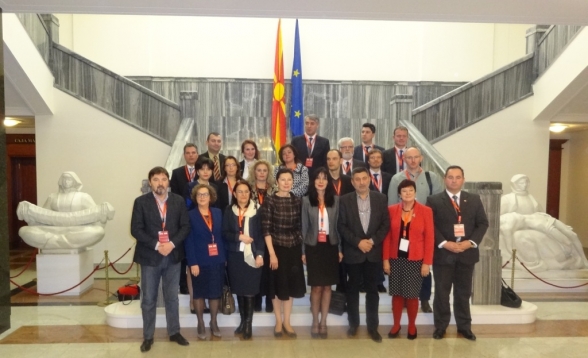Chairperson of the Committee on International Relations and Emigrants and Head of the Permanent Delegation of the Parliament of Montenegro to the Parliamentary Dimension of the Central European Initiative Mr Miodrag Vuković took part in the regular annual meeting of the CEI Parliamentary Assembly and meeting of the Committees on Political Affairs, held in Skopje, in the period 9-11 December of the current year, in the framework of Macedonian Presidency over the Initiative.
This year’s meeting of the Parliamentary Assembly addressed the following topics: "Emigrant crisis as a global problem and a challenge: How realistic is just a regional solution (Europe, CEI, Western Balkans)?" and "Interconnection of the CEI region in the EU context”. The plenary meeting was preceded by meetings of three general committees of CEI PD.
The regular meeting was opened by President of the Assembly of the Republic of Macedonia Mr Trajko Veljanoski, while, inter alia, the following addressed the attendees during the continuation: Mr Oliver Spasovski, Minister of Internal Affairs of Republic of Macedonia, Ms Ermira Mehmeti, Chairperson of the European Affairs Committee of the Assembly of Macedonia and Ms Margot Klestil Lofler, Deputy Secretary General of CEI.
It was stressed at the meeting that emigrant crisis should be seen not only as a regional but also as a European and global problem, hence the EU member states and governments have been called to undertake concreate measures to overcome the existing situation. They underlined that the solution may be found primarily by joint and synchronised activities, and that each one-sided action might cause the chain reaction and problems to the regional countries. Additionally, they emphasised the necessity of recognising the distinction between the refugees who had been leaving the war-affected areas and economic migrants whose aim was primarily to improve the quality of life.
One of the conclusions from the annual meeting is a position that integration of the Western Balkans countries to NATO will contribute to providing peace and stability in the region and accelerating their membership to the EU.
At the end of the meeting, the Joint Declaration was unanimously adopted, summarising the conclusions from the held meeting of the Parliamentary Assembly of the Central European Initiative.
The CEI is the oldest regional initiative in the Central and Southeast Europe region. It exists since 1989 and has 18 member states. Those are: Albania, Austria, Belarus, Bosnia and Herzegovina, Bulgaria, Montenegro, Czech Republic, Croatia, Italy, Hungary, Macedonia, Moldova, Poland, Romania, Slovakia, Slovenia, Serbia and Ukraine.









